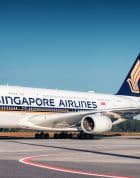Years ago, when I first began optimizing my credit card rewards strategies, I opted to focus on cash back credit cards. At the time, I assumed that award travel would be more complicated and less flexible, and I wanted a simpler solution.
However, since then, I’ve come to realize how wrong I was. The benefits of award travel far outweigh the complexities. Sure, it might be a bit daunting to figure out at first, but the rewards can be massive.
If you’re trying to up your rewards game and are wondering what all the fuss is about, you’ve come to the right place. I’ll outline the pros and cons of award travel, so you can see for yourself how the challenges and prizes stack up.
Pro: Premium Experiences at a Fraction of the Price
Let’s get the obvious one out of the way first: you’re here because you’re awesome, and you want to do awesome things with your life. Award travel opens doors for incredible opportunities that would otherwise be unrealistic for most of us.
Let’s take a one-way flight in ANA First Class from North America to Asia. This can be booked for as few as 110,000 Aeroplan points, which can be earned with a single welcome bonus from a premium Aeroplan credit card, plus a $599 annual fee.
In this case, the cash cost for a First Class award flight is cheaper than an economy ticket!

Alternatively, with a cash booking, you could book the same route for thousands upon thousands of dollars. Even if you can afford it, you’d be foolish not to pursue the same booking with points instead.
The value isn’t only found at the highest of the high-end redemptions, either. You can achieve similar experiences on many business class redemptions that will still knock your socks off.
Once you get to your destination, luxurious hotels await, where points bookings are much more achievable than cash prices.
If you’ve ever wanted to visit a decadent desert oasis paradise, the Al Maha Desert Resort Dubai is tough to beat. The resort offers high-end dining and two complimentary activities per day, all included in the price of your room. But even in low season, a five-night stay will set you back nearly $6,500 (CAD).
Instead, you could pay 368,000 Marriott Bonvoy points for the same incredible all-inclusive package.
With a few welcome bonuses and less than $1,000 in annual fees, you and your partner could earn enough points for a dream holiday at a fraction of the cash price.

Elite status can elevate these experiences even further. Opportunities to earn and use points and status often go hand-in-hand, and status benefits shine brightest at the best hotels.
For example, by simply holding the US-issued Marriott Bonvoy Brilliant American Express Card, you’ll enjoy Platinum Elite status year-after-year, which you can leverage for room upgrades, late checkout, and free breakfast at hotel stays.
I love award travel because it’s an empowering way to allow me to make choices that would otherwise be out of reach, but which do add value to my life. It’s not just that it’s easier to say yes when cash costs are no longer a barrier – it also opens my mind to aspirations that I wouldn’t have ever considered, even if they were already in line with my goals and principles.
No matter your tastes or travel style, there’s room for a little upgrade for everyone. I see award travel as a healthy form of lifestyle creep that doesn’t break the bank.
Con: Temptation to Spend More
On the other hand, you have to be careful that the lifestyle creep doesn’t spiral out of control.
Gigantic credit card signup bonuses can be tempting, as they present the fastest path to scoring your dream trip. However, the cards with the biggest bonuses, like the American Express Business Platinum Card, also come with the steepest requirements.
Never, ever, ever take on additional expenses to meet a minimum spend requirement. You’ll come out behind if you buy things you don’t need just to chase welcome bonuses. Slow and steady wins the race if you’re a low spender.
You might also fall into this trap of buying things you don’t need on the redemption side. For example, for 50,000 Aeroplan points, you could score either a round-trip business class ticket from Vancouver to Toronto, or two round-trip economy tickets.
While it’s tempting to fly business class just because you can, you need to consider whether you’d personally get more value out of booking two trips in economy instead. And don’t be too focused on sweet spots at the expense of your own desires. Points are easy and cheap to come by in the grand scheme of things, but that doesn’t mean you should throw them around like they’re worthless.
In addition, there are some hidden costs to award travel. Fuel surcharges can be mitigated, but not all fees can be avoided. Points aren’t quite as simple as a free trip!
Resort properties tend to have very high restaurant prices (if not all-inclusive) and other resort fees. Watch out for this if you’re planning to book four complementary nights at the Atlantis Paradise Island in the Bahamas, or any properties in the Maldives. In particular, reef destinations require a seaplane or speedboat transfer to access the hotel, which is charged as a separate (and quite high) cash fee.

Pro: Stopovers on Fixed-Price Awards
Many frequent flyer programs price award tickets based on the distance flown, or even better, based on the region that the origin and destination are located.
This means that tickets have a predictable cost. It’s easy to see how many points you’d need to get from your origin to your destination. Those costs are consistent, and they aren’t dependent on the price of cash fares.
Consider the generous stopover policies of many fixed-chart programs, and you can stretch your value even further. Many loyalty programs allow you to add one or more additional destinations on a points ticket, even on different continents if you’d like, for little to no extra cost.
You can also string together some long layovers to squeeze in a taste of yet another city. This option isn’t available for cash bookings, which are designed to take you from your origin to your destination as seamlessly as possible. With points, you can customize your itineraries to your heart’s content (well, at least within the limits of the program’s routing rules).
Aeroplan, Air France/KLM Flying Blue, and Alaska Mileage Plan allow stopovers on award tickets with partner airlines. British Airways Avios, Cathay Asia Miles, and All Nippon Airways allow multiple destinations on round-the-world multi-carrier tickets. The cash prices of these itineraries would be exorbitant, as you’d have to pay for each flight segment individually.
Similarly, you can take advantage of the Fifth Night Free benefit on hotel points bookings with Marriott Bonvoy or Hilton Honors. Paying for four nights but staying for five is the same idea as paying for one flight destination but stopping at two – you’re extending your value (and your trip) in a way that’s not possible with cash.
Award travel is a great way to book, if you’re interested in the quantity of destinations or the quality of flights. Luckily, the two aren’t mutually exclusive!
Con: Dynamic Pricing
Not all airlines offer fixed award pricing. The alternative, known as a dynamic pricing model, sees the points pricing rise and fall with the underlying cash price of a ticket.
If points fares are expensive when cash fares are expensive, that takes away a big advantage of using points to keep your costs down. Without a transparent award chart, it also makes it harder to predict how much your points bookings will cost.
Air Canada uses dynamic pricing for Aeroplan tickets on their own metal. In many cases, it’s actually better to avoid using Aeroplan points to book flights with Air Canada, since partner airlines have predictable, fixed pricing.
Sadly, it seems that the travel industry is slowly but surely moving towards dynamic pricing. United, Delta, and Hilton all do it, and I wouldn’t be surprised to see other companies follow suit.
Dynamic pricing is the poster child for devaluations. There’s no way around it – dynamic pricing is an unfortunate trend that only hurts the customer.
Pro: Higher Value for Credit Card Rewards
Let’s face it: you probably already have a credit card, you probably use it for the bulk of your expenses, and you probably earn rewards on it.
So if you’re earning credit card rewards anyway, why not try to extract as much value as you can?
Some rewards have a fixed value. Cash back is the most obvious one. There are also travel rewards programs with a fixed value: TD Rewards and Scene+ can be used for a variety of travel purchases, but at a flat rate with a consistent cash-equivalent value (0.5 and 1 cent per point, respectively).
Other travel rewards have a variable value. Some banks, like RBC, CIBC, and American Express, offer a flight rewards chart, which uses a set amount of points for tickets up to a certain cash price. Often, this is better value than redeeming your points for statement credit and buying airfare with cash outright.
Airline loyalty programs are an even more powerful way to stretch your value. With the creative ways that you can push the boundaries of an award ticket, and with stopovers and segment-by-segment routing, the gap between the value of your redemption and the face value of your points only widens.
The way the industry is set up, travel rewards are the best way to increase the value of your points. Whether you’re earning airline or hotel points directly on a co-branded credit card, or focusing on transferable points from Amex, RBC, or HSBC, suddenly 1 point per dollar is worth a lot more than 1%.
Con: Cash Is King
While travel rewards always offer the best value, that means that you have to use your points for travel to get the best value. Surely a good problem to have for avid travellers, but not always realistic. This creates a bit of inflexibility if you’re looking to maximize.
Sure, you could use your points to buy merchandise, but the value of these redemptions pales in comparison to using them for travel. It’s so bad we don’t even acknowledge it. From a numerical perspective, it’s better to buy merchandise with cash and save your points for travel, not the other way around.
It’s possible that you’ve ended up with an enormous amount of points, but no way to use them. This might happen if, say, some unforeseeable circumstances make global travel impractical for an extended period of time.
Also, you can’t use points until you have enough to make a redemption. This can be a problem for secondary programs that you’ve been slowly collecting on the side. You’d need to earn more before you can burn what you have, and you might prefer to earn something else instead.
If you acquired points by paying annual fees on credit cards, or by buying them outright, those cash costs are now locked up in an asset that you can’t use. This is why I’m careful not to put too much money or effort into points programs that are low priorities for me.
Unfortunately, points are a depreciating asset, for two reasons. First, you can’t earn interest on points. Second, loyalty programs are prone to devaluations at any time.
Earn and burn is the best way to make sure you’re getting your expected value for your points. But sometimes it doesn’t work out, whether for controllable or uncontrollable reasons. If you think you might need to hoard points for a while, cash might be a better option after all.
Pro: Affordable Last-Minute Bookings
If you’ve ever had to take a last-minute trip for a family emergency, surely you’ve seen that cash costs for flights skyrocket as the travel date approaches. Such is the nature of scarcity. And if you have no choice but to travel, you’ll pay any expense.
Even for more light-hearted spontaneous travel plans, you’ll face the same problem. The price might even be a deterrent to taking the trip entirely.
Luckily, you can make last-minute award ticket bookings without breaking the bank. Whenever a sudden expense comes up, it’s always nice to be able to pay with something other than cash. If the points booking uses dynamic pricing, or if it’s fixed pricing at a weaker value than what you’d like, it’ll still ease the sting a little bit.
However, this assumes that you don’t have any trouble with…
Con: Award Availability
Not every seat on a flight can always be booked on points. This notion discourages many people who are hesitant to get into award travel.
(Rewards programs that do allow “any seat to be booked on points” – even if it’s at a poor value – tend to heavily advertise it, because they know how much frustration it causes customers.)
Finding award availability on your preferred segments can be quite a challenge. You have to juggle your travel dates, the size of your travelling party, your preferred airlines and airports… it’s not easy!
The less flexibility you have, the sooner in advance you’ll need to book. And then you’re also contending with how far out each airline releases their award calendar.
Even the process of finding available seats isn’t always straightforward. Depending on how each airline’s award inventory shows up in different systems, you might need to search for a flight on one airline’s metal, from another airline’s search engine, to be booked via a third airline’s frequent flyer program.

It helps to use tools like ExpertFlyer, but not everyone has the time or skills to figure out how to master them. Ultimately, if you can’t find the seats you need, your points are worthless.
Pro: Flexible Changes & Cancellations
During the pandemic, we saw a lot of airlines temporarily waive their fees for changes and cancellations, on both cash and points bookings. Normally, though, it’s much easier and cheaper to cancel an award ticket.
Depending on which fare class you purchase, your Air Canada ticket may be entirely non-refundable, refundable for credit, or fully refundable. Instead, if you book with Aeroplan points, you can get all of your points and fees back, and only pay a cancellation fee up to $150.
This is definitely an appealing insurance policy for travellers who don’t want to pay a higher ticket price for flexibility.
As you can see, the price jump from Economy (Standard) to the fully-refundable Economy (Comfort) fare is quite steep. If you’re only interested in the cancellation policy, it’s more expensive than the Aeroplan cancellation fee, which you wouldn’t even need to pay unless you actually do cancel the ticket.
So, in addition to the flexibility of booking last-minute, points also grant you the flexibility of cancelling last-minute. Cash might work if you can plan well in advance with some certainty, but if this past few years have shown us anything, it’s that we can’t take anything for granted.
Con: Staying Organized
As you get more involved with miles and points, it only becomes a bigger and bigger task. The most meticulous collectors will at times struggle to stay on top of all of the details. Even the pros aren’t perfect!
It’s not so bad getting started with one or two cards or award programs. But as you expand your horizons and start seeing achievable value everywhere, suddenly you’re paying attention to multiple credit card payments, annual fees and upcoming plans to close accounts, several simultaneous minimum spend requirements, expiring points, Player 2’s accounts… the list is endless!
The more types of points you collect, the more programs you have to understand. If you thought it was hard enough wrapping your head around Aeroplan’s routing rules, pricing charts, and award availability, just imagine also doing that for Alaska Mileage Plan, British Airways Avios, and Cathay Pacific Asia Miles. Then, you have to take all of that information and figure out the best way to meet your goals with the different earning and redeeming opportunities available.
All the while, you’re also watching the news and message boards like a hawk. You’re on the lookout for new credit card signup bonuses, limited time offers or transfer bonuses, and cautionary tales from the community regarding best practices.
Not to mention, as your network grows, you’re not just talking shop with a few close friends anymore. As the connections you make snowball into wider webs, now you’ve got to keep up with dozens of group chats, some with hundreds of people.
Sometimes I honestly don’t know how I do it. I probably have about 50 accounts I keep track of, between Canadian and US credit cards, bank accounts, prepaid cards, and loyalty programs.
Often I’m so eager to jump on the next best thing that I neglect to keep my spreadsheets in order. As much as I truly enjoy the analytical aspects of this pursuit, it’s no fun when you fall behind and have to reconcile several months of transactions.
Conclusion
On balance, I think it’s absolutely worth it to use points for award travel. (I wouldn’t be writing about it if I didn’t!) All of the cons can be mitigated, and they shouldn’t detract from using points to supercharge your travel aspirations.
I like to say there are three key ingredients to maximize your benefits from credit card rewards: you love travel, you’re organized, and you’re always looking for something more. The more you have of each of those traits, the more you’ll get out of your points.
Whether you’re aggressively earning towards a specific redemption, or gathering points as an emergency fund for future travel, there’s always a place for award strategies in any traveller’s arsenal.





















Do you have a template of this beautiful excel credit card travel we can download?
What a pleasure to see that I’m not the only one to feel this way after more than 4 years of travel hacking.
I realized that it was consuming a lot of my time, and that I had to pace myself because it’s impossible to optimize everything 100%.
Your article is the only one I’ve seen talking about this aspect of travel hacking.
Great pleasure reading it.
Thanks a lot !